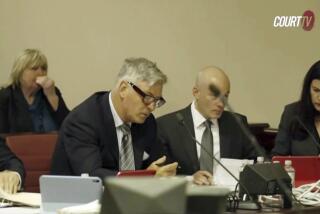Informed Opinions on Today’s Topics : For Would-Be Jurors, Duty a 4-Letter Word
- Share via
Although it is a civic responsibility, only about 5% of those who receive a jury summons actually serve.
The low level of participation raises questions as to whether juries are representative of the community or merely representative of the few willing to serve--or those whose employers are willing to pay for jury duty.
However, since the judicial system depends on jurors, officials are taking a hard look at improving participation, trying to make it easier for those who serve and more difficult to ignore a jury summons.
What will boost the jury system?
Los Angeles County Dist. Atty. Gil Garcetti:
“My problem is that most people who receive jury summons either talk their way out of it or have a crisis at home or simply toss away their jury summons and nothing ever happens. We have addressed the latter and we are going after them now with contempt proceedings. . . . We have also been discussing . . . how jurors are treated, the conditions they have to serve in--hot jury assembly rooms with a television blaring and no facilities for people who want to work while waiting. . . . The $5 a day is a slap in the face. And they only get paid mileage one way. It should be to and from the courthouse.”
Judge Gary Klausner, presiding judge of Los Angeles County Superior Court:
“Although we sit here with 7,000 jurors a day . . . I would rather make sure that the jurors . . . felt that this was a small court with personal attention. . . . Right now they may come in and sit for 10 days and never sit on a case. Of those that actually get chosen . . . a vast majority of them feel some value in the system. . . . Each one of them needs to be treated with dignity. . . . If the jurors lose confidence in the system, I think the entire system is seriously weakened.”
State Assemblyman James Rogan (R-Glendale), former judge and prosecutor:
“I found that most people, when they get their summons, do balk and do not want to perform the jury service because it’s an imposition. . . . But my experience has been that once they have gone through the process and realize they are being charged with a very weighty decision, most of them are more willing to participate. . . . Some judges do not treat the jurors’ time as gold. . . . I don’t think it’s the system that has been at fault or the limited pay. If you can keep the trial moving and not give the jury a sense of time being wasted, they not only feel like they are doing something important but they are enjoying the process.”
USC law professor Erwin Chemerinsky:
“Some jurisdictions have gone to the one-day or one-trial system. It would mean being called more often, but would be a more effective use of their time. . . . I think treating jurors more humanely will make a difference. There are long periods of waiting in which nothing goes on. If you read the books by the Simpson jurors, they were treated with extreme rudeness and there were times when there were only two-thirds of the seats available for the jurors in the lunch room.”
Please send suggestions for possible topics to On the Issue, Los Angeles Times, 20000 Prairie St., Chatsworth 91311, fax, (818) 772-3338; e-mail, [email protected] Please include your name and daytime phone number.
More to Read
Sign up for Essential California
The most important California stories and recommendations in your inbox every morning.
You may occasionally receive promotional content from the Los Angeles Times.










